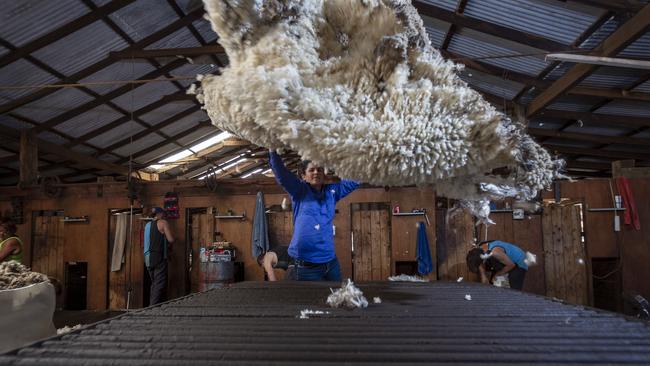
“Australian companies with business models geared towards China need to understand that it is not the government’s responsibility to bail them out in the event of a downturn in the China market,” it says.
“To do so would lead to a moral hazard problem where businesses do not need to account fully for the risks they face.”
But the new report by the institute also warns the government against taking deliberate measures to force companies to cut back business with China.
The report notes that 60 per cent of the net $180bn increase in Australian exports in the decade to 2018-19 has come from exports to China, followed by only a small increase in trade with Japan, South Korea, the US, India and Indonesia.
Australia’s two-way trade with China hit a record $235bn in 2018-19, way above the $88.5bn trade with our second-largest trading partner, Japan.
ACRI criticises “the argument that Australia’s national interest is best served by the government forcing a decoupling of the Australian and Chinese economies” as a “zombie idea” which deserves to be “laid to rest once and for all”.
Comes after warnings
The report, which comes after last week’s warnings from Chinese ambassador Cheng Jingye, that exports to China could fall if Chinese consumers were upset by Australia’s call for an inquiry into the origins of the COVID-19 pandemic, says Australian businesses with a heavy exposure to China — including wine, wool and universities — need to understand the political and economic risks of the market.
This included recognising that the government may take decisions in what it sees as being in Australia’s national interests that could impact their business if China sought to retaliate.
“Australian businesses need to recognise and factor into their risk management the possibility that their business model could suffer if China applied coercive economic pressure in retaliation,” it says.
The report strongly challenges the idea that the COVID-19 crisis and the recent increase in political tensions shows that Australia is too dependent on China and should reduce Australian trade with China.
It points out that concerted attempts by the government to diversify exports away from their heavy reliance on the Chinese market — including trade delegations and new free trade agreements — have had limited success over the years.
“Forcing trade ties away from China guarantees less Australian income and jobs,” it says.
Clear accounting needed
“If Australian businesses were to be forced to sell less to China than they otherwise could, then the Australian public deserve to be presented with a clear accounting of how many jobs this will cost.”
It warns that any forced reduction of trade ties with China would also reduce government revenues from corporate taxes, which would need to be offset by higher taxes on households.
“And China opportunities that Australian businesses would be forced to leave on the table would be quickly snapped up by international competitors,” it says.
The report notes that universities have come under heavy criticism, particularly in the wake of the coronavirus crisis this year, for their heavy dependence on the Chinese student market.
But it argues that seizing market opportunities with China has also seen seven leading Australian universities earn a place among the world’s top 100 universities.
The report says Sydney University and the University of NSW were most reliant on Chinese students, funding some 25 per cent of their budget.
It says other universities, including UTS (where ACRI is based), Macquarie University and the University of Western Sydney, have a much lower dependence on income from Chinese students, well below 20 per cent.
The report notes that while the focus in recent months has been on the reliance of the university sector on Chinese students, wine and wool sales to China represented a much higher proportion of export sales.
Some 20 per cent of Australia’s $6.4bn wine exports go to China while 80 per cent of our $3.2bn wool output is sold to China.
The report says arguments that Australia has been too dependent on its trade with China ignore the fact that no other country has stepped up to take anywhere near as much Australian exports. “… a telling statistic is that over the past decade, the total annual value of Australia’s exports has risen by $180bn. Very few would argue that this jump has been anything other than in Australia’s interests.”








Businesses hit by a downturn in trade with China should not expect to be bailed out by the federal government, a new report to be released on Thursday by the Australia China Relations Institute (ACRI) warns.